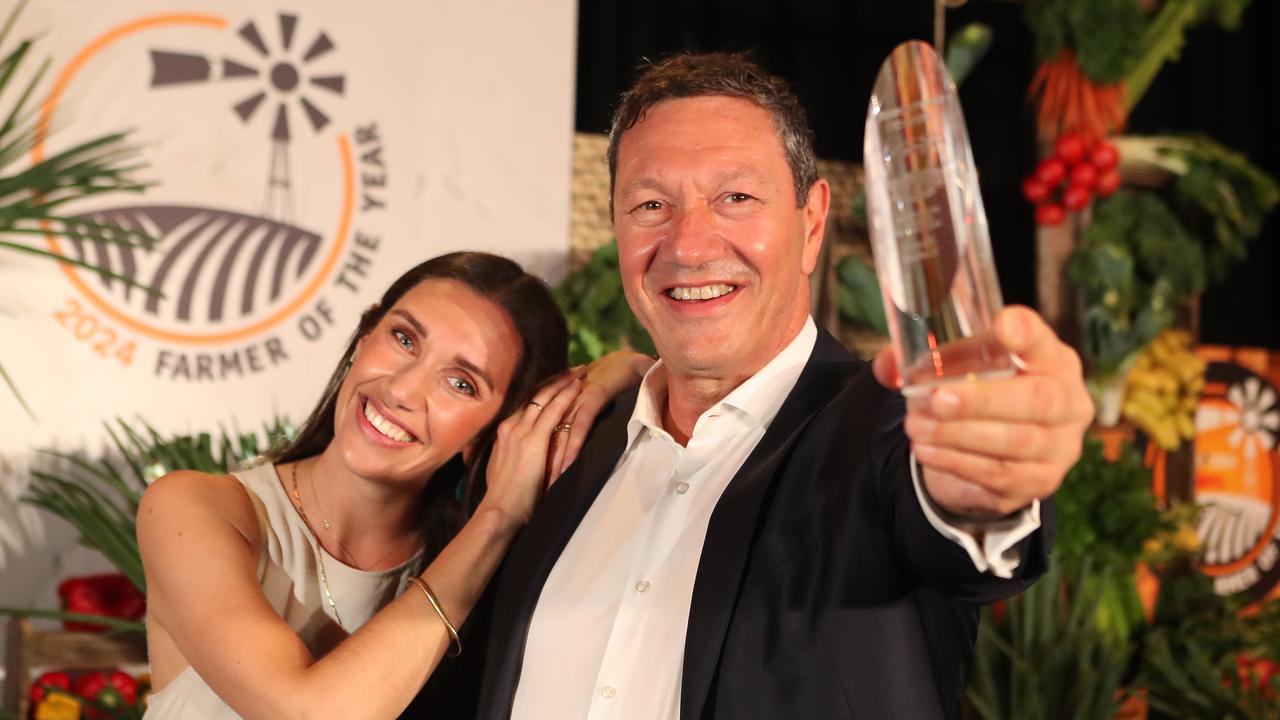Farmer of the Year: Konzag Grains, Cranmore Farming and Thompsons announced as cropping finalists
Backed into their respective corners, these family cropping ventures chose to be nimble and innovative, and saw yields and profits soar.
Meet the three family-run cropping operations that, by focusing on innovation, sustainable practice and efficiency have been named finalists in the cropping category of The Weekly Times Coles 2022 Farmer of the Year awards.
Stay tuned for the announcement of the six category award recipients and overall winner on Friday 24 February.
Meet the rest of the finalists here.
KONZAG FAMILY
KONZAG GRAINS
MALLALA, SA
Farmers can be at their most innovative when faced with a set of limitations.
Take Richard Konzag.
He could have followed the family blueprint and reaped respectable yields from his 2500-hectare family dryland cereal, pulse and oilseed farm at Mallala, 60km north of Adelaide.
But the sixth-generation farmer is a trier of ideas and driven to discover what lays beyond the limits.
When he took the keys almost 40 years ago he decided to retain waist-high standing stubble in the arid fields when few in the area dared.
The trapped moisture and improved soil quality worked a charm, producing yields beyond what his forebears took to market.
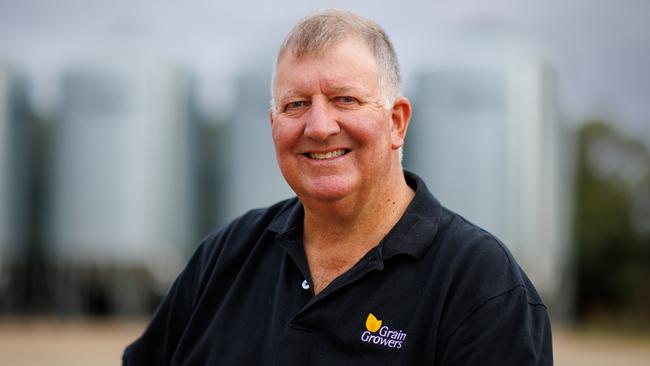
However, a more unconventional method has reaped greater rewards.
In 2014, Richard used a John Deere 1890 single disc seeder dealer demo with 19cm row spacings to sow wheat.
The 432 grain heads harvested per square metre exceeded the 306 heads produced by his Conserva Pak knifepoint seeder, with 30cm row spacings.
So he purchased a JD 1890.
The following year Richard tested a neighbour’s stripper front, used to bale hay, alongside his draper front. Testing found 48mm more plant-available water in the stripper-straw soil, after seeding wheat, compared with the draper-straw soil.
So, he swapped the draper for a stripper and, in putting them together, joined the 1 per cent of Australian farmers then using a “disc-stripper”.
“If my father and grandfather saw us sowing into a standing wheat stubble they would think we were certifiable,” he says.
“Barley was 18 bags to the acre in 1982 and Dad said: ‘You’ll never grow a better crop than that’.
“But as technology and varieties improved with research and development the last yields were over 30 bags.”
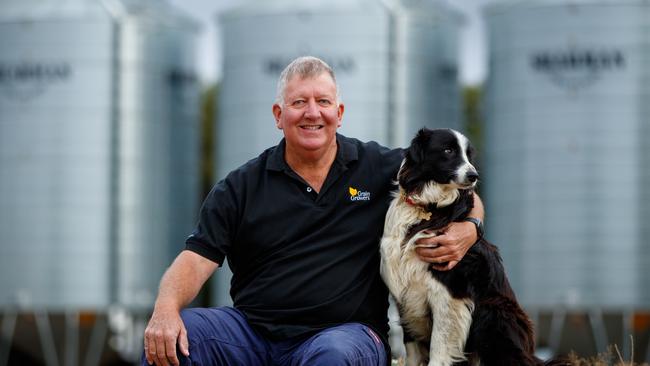
Richard’s wife, Trish, holds the administration of Konzag Grains together while son Ryan recently returned home with a Bachelor of Agribusiness and ideas of his own.
“All the agtech, drones, apps have been incredibly useful. But, whatever the generation, it is still important to know your paddocks intimately,” Richard says.
The 2022 Konzag winter crop was exceptional, particularly lentils at 3.4 tonnes per hectare against the longstanding 1.7 tonnes/ha average.
The old guard is the future.
TRACY AND KRISTIN LEFROY
CRANMORE FARMING
MOORA, WA
It’s almost Darwinian.
Cranmore Farming, a family grains, oilseed, sheep, wool and beef operation 160km north of Perth sits near the desert fringe and greets just 400mm of rainfall a year, typical West Australian Wheatbelt country.
The brackish groundwater beneath the clay soil has a salt content of 10,000 parts per million.
But, after the Moora region almost ran dry and with predictions of drier future climatic conditions, Cranmore owners Tracy and Kristin Lefroy decided to adapt to survive.
A solar-powered desalination plant was subsequently installed on-farm, in collaboration with Murdoch University, with the goal of securing stock and spraying water, and essentially droughtproofing their 4500 hectares of owned and leased land.
The desalination plant is just part of the Lefroys’ commitment to sustainability, which has helped them increase crop production over the past 15 years, to now account for 70 per cent of their land’s use.
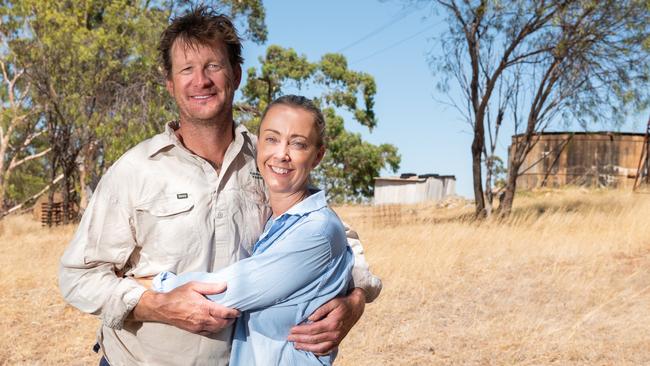
Cranmore has been home to the family’s successful Merino stud for more than a century. Under Tracy and Kristin’s watch, it has also become a grain-producing powerhouse.
Last year, the couple sowed 2457 hectares of wheat, 1401 hectares of canola, 670 hectares of barley, 373 hectares of oaten hay and 168 hectares of oats.
Coming off a bumper 2021, when the Lefroys recorded their second-highest income with 5 per cent return on capital, they had a more challenging 2022, with cost of seed, freight, wages, chemicals and fertilisers all above average.
By investing in technology and refining on-farm practices, they are dealing with climate and cost challenges head-on while still maximising production.
Soil testing informs targeted fertiliser use, and an integrated weed management program helps reduce the need for herbicides. Plus, the family has run an extensive tree-planting program for decades, to help protect soil, stop erosion, manage the underground water table and provide habitat for wildlife.
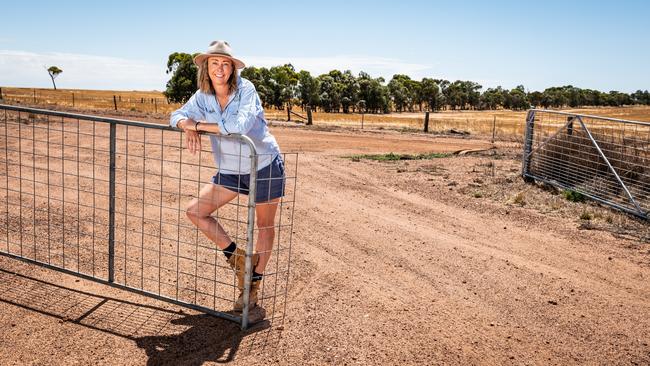
“Sustainability underlines everything we do, we have taken small steps with our on-farm desalination plant, confined feeding of livestock to reduce environmental impact while freeing up cropping land and seeking out technology that allows for more prudent use of herbicides and fertilisers,” Tracy says.
Not so long ago attempting to beat the weather was a fool’s errand. Not now.
DAVID AND JENNY THOMPSON
BETHUNGRA PARK
ILLABO NSW
David and Jenny Thompson definitely have it covered. Their soil, that is.
Maintaining ground cover is central to their scientific approach to producing top-notch crops, using fewer inputs while still achieving bumper yields even in the driest years.
The southern NSW mixed farmers grow canola, wheat and barley across 1200 hectares of their 2300-hectare property, where they also run 3000 Merino ewes.
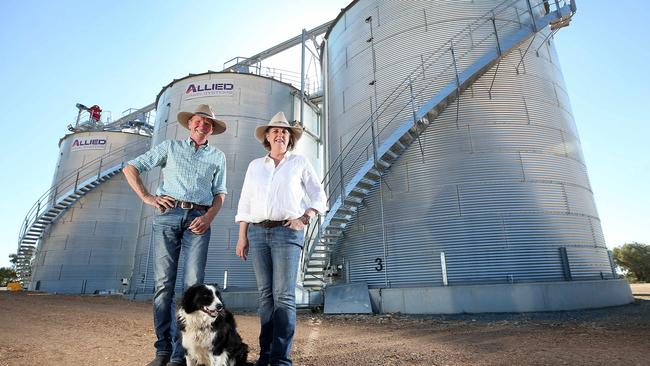
Cropping runs in David’s blood. He has spent much of his life working on his family’s Riverina property at Illabo.
When he and Jenny set up their operation as part of a family succession plan in 2010, however, they were keen to find ways to wind back reliance on synthetic sprays.
Over the past decade, they have implemented a strip and disc system of sowing and harvesting, to retain tall standing stubble in paddocks. Three seasons of background straw are left in the ground, creating mulch to retain moisture, repress weeds and encourage soil microbiology.
“As you peel back the layers, you can see fungi starting to break down some of the straw, improving the soil and getting better infiltration,” David says.
Maximising soil cover is the first step to improving its health, and lays ground work to enable them to cut fungicides and insecticides.
To help manage pests with fewer chemical inputs, the couple sow some crops earlier in the season. They also graze their sheep in problem paddocks to tackle rust.
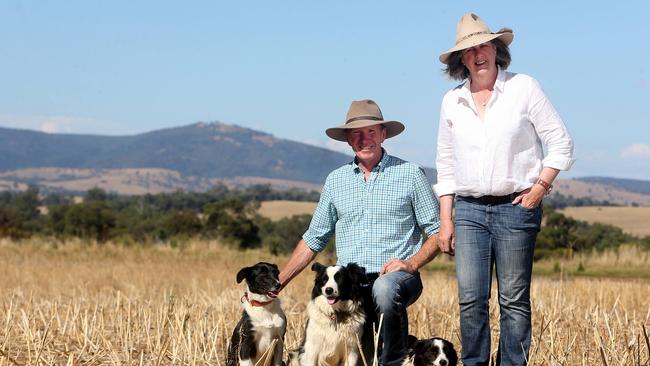
In place of traditional sprays, they have started using foliar nutritional sprays, which David says are “complicated mixes”, but worth the effort.
The approach has delivered strong yields, averaging 5.2 tonnes a hectare for wheat, 4.7 tonnes for barley and two tonnes for canola. Even in the past year of unusually wet conditions, the most recent wheat crop returned an admirable 5.5 tonnes a hectare.
“We feel that where we are heading is working,” David says.



